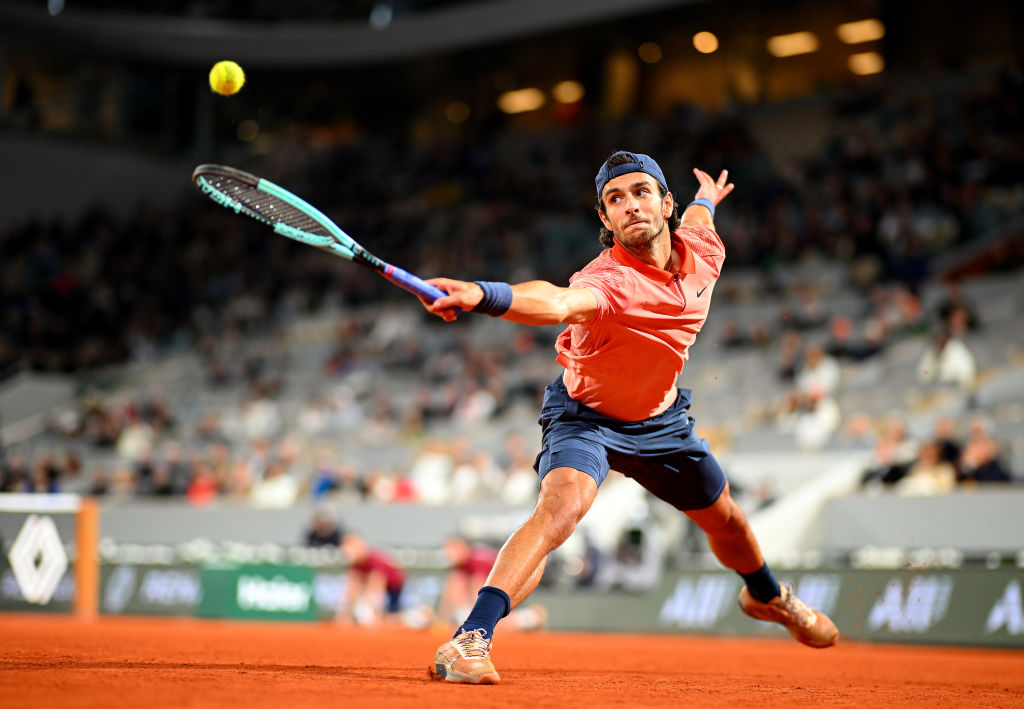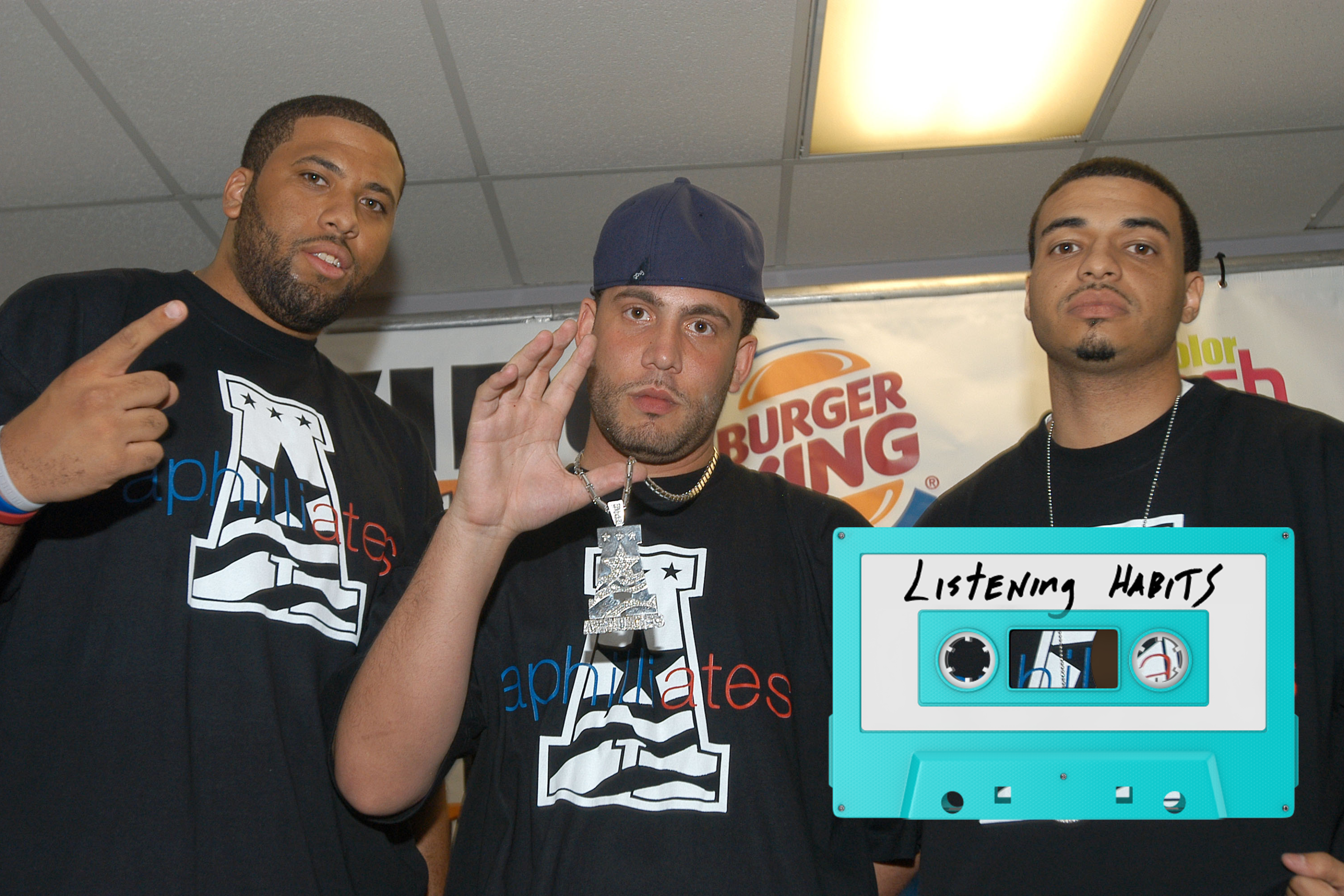It’s hard to put a positive spin on Lorenzo Musetti losing to Novak Djokovic at Roland Garros—again—in five sets after having a lead—again—after Djokovic looked flat and/or uninterested for significant phases of the match—again. After three sets, Musetti led 5-7, 7-6, 6-2 and had Djokovic, a legendarily tireless baseliner, making kamikaze rushes to the net to end points as soon as possible to appease his flagging cardio. With that in mind, Musetti will probably endure an unhealthy number of sleepless nights wondering how this match got away. But I want to try to praise him here.
In the fourth round of the 2021 tournament, a 19-year-old Musetti got his first shot at Djokovic and shockingly took the first two sets from him, winning both in tiebreaks. Djokovic reeled off 16 of the next 17 games, and down 4-0 in the fifth set, Musetti quit the match and shook hands with Djokovic then and there. The assumption was that he was hurt, but in his post-match press conference, Musetti admitted that he wasn’t significantly injured; he just threw in the towel because he couldn’t win points anymore.
Down 4-0 in the fifth set of the match on Saturday night, having blown another lead (albeit a two-sets-to-one advantage rather than 2-0 this time), Musetti must have been fed up with Djokovic, with tennis, and with the whole goddamn world. He’s had a rocky three years since the 2021 indignity—occasional highs like wins over Djokovic and Carlos Alcaraz at the best-of-three level, but far more prolonged and puzzling lows. However, he’d persevered, he’d gotten his Djokovic rematch, and he’d shown better stamina and more consistency, even making tennis’s GOAT look jarringly ordinary for large parts of the first three sets. Despite all of that, he was back in the exact same place as when he quit three years ago.
Musetti lost the fifth set, 6-0. Djokovic finally settled into his killer-robot mode and stopped making mistakes even as he hit nuclear forehands to minuscule targets at the corners of the court. Musetti could do nothing but put on a brave face.
For what it’s worth, I thought he wore the mask convincingly. At 4-0, 30-love in the deciding fifth set, Musetti tried a drop shot. Djokovic dashed up to it and replied with one of his own: a cuter, spinnier ball that bounced low and short in the court. There was no practical point in chasing it, as far behind as Musetti was. But he tailed after the ball, fulfilling the unreasonable expectations of all sports fans to somehow try harder when a win is more hopeless, and found a stunning angle for a crosscourt backhand winner. Djokovic gave him a thumbs-up.
Later in the game, with Djokovic one point away from 5-0, he got Musetti on the run. Go here, puppet, then there, then here again. Given up on a happy existence yet? Musetti made two great gets in his backhand corner. Then, after a sprint across the court, he somehow delivered an atomic forehand winner on the dead run that slotted through a gap in Djokovic’s defenses just about one tennis ball wide. In a delightfully pissy gesture, Djokovic covered his eyes and mimed hitting a forehand, to say that Musetti’s winner was one only pure hope and luck could have produced. Maybe so. But Musetti made it possible by suffering through the first few shots of the rally.
Djokovic closed out the game for 5-0, then leveled up yet again for the coup de grace, blistering better returns off of Musetti’s first serves than he had been hitting on second serves for the first three-and-a-half sets. On match point, Djokovic smacked a crosscourt forehand return winner past his defeated opponent—a shot Djokovic became instantly famous for when he hit it to save match point against Roger Federer at the U.S. Open more than a decade ago.
On the one hand, Musetti had three years to prep for this match, knowing full well what Djokovic was capable of, and lost to a man who has barely looked like himself this year. (Djokovic hasn’t won a tournament in 2024 and might, at 37, be finally entering a meaningful decline.) Yet Musetti let another big lead go and again faded badly as Djokovic, 15 years older, displayed the superior conditioning.
On the other hand, Musetti never quit, even when things looked just as bleak as they did three years ago. His improbable winners dragged out proceedings in the fifth set to add a tiny bit more misery to Djokovic’s night; Novak screamed in celebration when he finally killed off the 4-0 game. Despite the scoreline (and maybe things happened so fast that he was just a little dazed), Musetti didn’t throw a tantrum or lessen his effort in the slightest.
The concept of “fighting”—refusing to lose quietly—comes up a lot in tennis, typically in reverential tones as a player’s effort is praised. While I can appreciate a late-game push, I also think that a desire to fight is a fairly common element at the top of the sport. Most players on tour are excellent at not giving up; at these tournaments, those who are great fighters far outweigh those with a reputation for being a shitty competitor.
What is most impressive to me is a player fighting when a comeback is clearly mission impossible. Maintaining a high level of effort when there’s absolutely no reason to want to continue strikes me as the most difficult thing, particularly in a sport where there are no teammates to lift you up. Musetti knew he was toast at 4-0. Nothing he could do would have turned that loss into a win. Yet he tried anyway, because that is the expectation for professional tennis players. Sebastian Korda did something similar in his third-round loss to Alcaraz—throughout a tight second set, Korda was fist-pumping, yelling, and going toe-to-toe with the golden boy. When he lost that set, he visibly deflated. In the third, Korda stopped celebrating vocally and stopped chasing Alcaraz’s drop shots. But when Korda served at 1-4 and Alcaraz started pressing for yet another break of serve, Korda decided to dig in and ended up escaping with the game. It did not help him. He lost the match in exactly the same way one would expect from that position. But I will remember what he did.
Musetti shouldn’t have to hang his head. He played three-and-a-half brilliant sets against the best to ever do it, didn’t quit when the GOAT started playing like himself, and in the end got incinerated by just about the highest level of tennis imaginable. Everyone relevant on tour has suffered that fate at some point. Musetti probably will feel like shit, because he had his foot on Djokovic’s neck and couldn’t complete the biggest win of his career. But if tennis fans call him a disappointment for a performance like that, we might be setting the bar too damn high.






